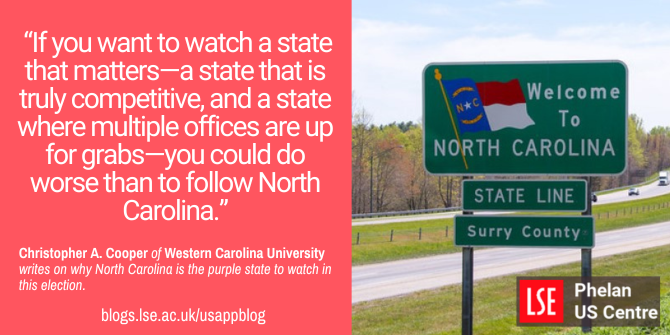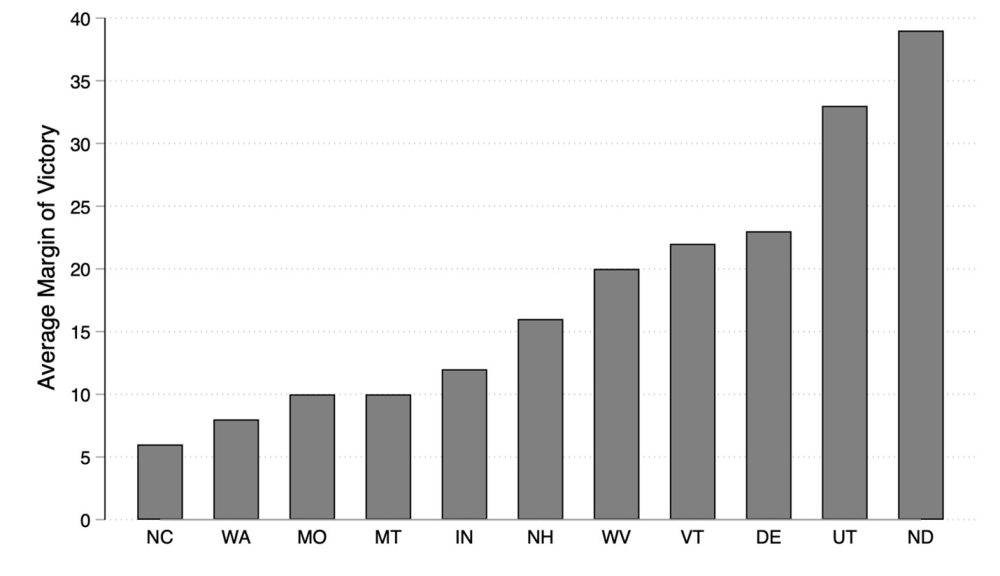Thanks to a polarized electorate and increasingly nationalized politics, the 2024 election outcomes in most American states are all but predetermined. Before a single vote is cast, we can safely count Joe Biden the winner in Massachusetts and Donald Trump the victor in Wyoming. Republican incumbent Greg Gianforte will win re-election to Montana’s governorship and whoever emerges from the Democratic gubernatorial primary in Delaware will almost certainly win the November General Election.
Polarization aided by strategic gerrymandering also means that fewer than 10 percent of congressional elections are truly competitive. State legislatures aren’t much different. In fact, many state legislative elections don’t even have candidates from both major parties.
From this vantage point, there are precious few states that are truly worth paying attention to in the 2024 elections in the United States. North Carolina is clearly on this short-list of competitive, purple states where the outcomes are not predetermined. Why is this?
A near tossup in the presidential election
Let’s start at the top of the ballot. North Carolina has not given its Electoral College votes to a Democratic presidential candidate since 2008, but Republicans should not take the Tar Heel State for granted. In the 2020 Presidential election, Donald Trump won North Carolina by 1.3 percentage points—the smallest margin of any state colored red on the map. If there is any state that is poised to “flip” from red to blue this cycle, it is North Carolina.
The Biden Team has clearly bought into this flippable state narrative, as they recently opened 10 field offices across the state and have visited enough times that Biden’s milkshake order is covered by the state press. The Trump campaign is also paying attention to North Carolina and even named the (then) head of the North Carolina Republican Party, Michael Whatley, as Chair of the Republican National Committee.
While no credible polls show Biden in the lead in North Carolina, most show a match-up that is within the margin of error, and therefore best considered a toss-up. For example, an April 2024 Meredith Poll showed Donald Trump with 41 percent of the vote, Joe Biden with 39 percent and Robert F. Kennedy Jr. with nine percent—well within the confidence interval of +/-3.5 percent.
It’s hard to know what will happen at the top of the ticket in North Carolina. And that’s precisely the point.
The gubernatorial election – Stein vs Robinson
As consequential and contested as the presidential election in North Carolina is likely to be, it may get second billing to the 2024 Gubernatorial race. Democratic Governor Roy Cooper (the only Democratic Governor to win in a state won by Donald Trump in 2020) is limited from running for a third consecutive term. The 2024 match-up features current Democratic Attorney General Josh Stein versus current Lt. Governor Mark Robinson.
It’s hard to imagine two more different candidates than Stein and Robinson.
Stein is a traditional politician who obtained a law degree at Harvard, served in the North Carolina General Assembly, and then ran for statewide office, winning the North Carolina Attorney General Election in 2016 and 2020—both times by small margins. Stein is part of the Democratic establishment in the state and is closely aligned to Democratic Governor Roy Cooper. He is described as “disciplined,” “polished” and someone who has “caution and measure as a personality trait.” If you went to central casting and asked for a southern Democratic politician, they might very well return with Josh Stein.
Mark Robinson is nothing like that.
Mark Robinson is cut directly from the MAGA wing of the Republican Party. His rise to political power did not come through the traditional means, but rather after a pro-gun rights speech in 2018 at a Greensboro (NC) City council meeting that went viral. Mark Walker, then a member of Congress from the Greensboro area, posted the speech on Facebook where it was accessed more than three million times in just one week. In the words of a local reporter at the time, “The last time that happened was…let’s see…never.”

“160415-0810 Lowgap” (CC BY-NC-SA 2.0) by WashuOtaku
Just four months later, Robinson was headlining second amendment rallies and described in the pages of the Durham-Herald-Sun as a “notable Second Amendment advocate.” On the backs of this newfound fame, Robinson ran for Lt. Governor and won a crowded Republican primary for Lt. Governor about two years after his viral speech. He won the General Election eight months later over Democratic State Representative Yvonne Holley.
Robinson’s time in public life has come with more than its fair share of controversy. A 2022 article in the Raleigh News and Observer cited Robinson’s descriptions of the LGBTQ community “with words like ‘filth’”, derogatory comments aimed at the transgender community and statements that the movie Black Panther was “created by an agnostic Jew and put to film by a satanic Marxist.” In the months since, he has been profiled in the New York Times multiple times, including an article that cites his “well-documented history of antisemitic comments, staunch opposition to abortion and anti-L.G.B.T.Q. views.” Other national and international prestige press, including the Washington Post, CNN and The Guardian have covered Robinson—almost always with an emphasis on his inflammatory rhetoric.
The aforementioned April 2024 Meredith Poll shows Stein with a lead just outside of the margin of error. The reason for this small advantage: Stein’s 16 point lead among Unaffiliated voters—a group who currently makes up the plurality of North Carolina’s registered voters.
While the candidates themselves might be new, North Carolina is no stranger to competitive gubernatorial elections. Over the last five election cycles, North Carolina has averaged the smallest margin of victory among the states that are holding gubernatorial elections in 2024 (Figure 1).
Figure 1 – Average margin of victory in previous gubernatorial elections (2000-2020) for states up for election in 2024

In the end, North Carolina’s battleground status combined with the nationalized politics represented in these two divergent candidates will likely make North Carolina’s gubernatorial election the most expensive, most watched, and most competitive in the country.
Congressional Delegation
North Carolina’s congressional delegation is currently made up of seven Democrats and seven Republicans—a ratio that some argue befits the state’s purple character. All of that is about to change.
The North Carolina General Assembly redrew North Carolina’s congressional districts in 2023 and the process produced maps that, in all likelihood, will produce three Democratic member of Congress, 10 Republican members of Congress and one district that is competitive. After the maps were released and the long odds were revealed, incumbent Democrats Jeff Jackson, Wiley Nickel, and Kathy Manning chose not to run for re-election to their congressional seats. Republicans Dan Bishop and Patrick McHenry are also not running for re-election, albeit for different reasons.
As Table 1 shows, the only competitive district in North Carolina is the first congressional district, currently represented by Democrat Don Davis. Davis’ district leaned slightly towards Joe Biden in the 2020 election and slightly to Republican Ted Budd in the 2022 Senate race. It is, in every respect, a toss-up district.
Table 1 – 2020 Trump 2 Party Vote Share Under 2022 & 2024 NC Congressional Maps
| District | Incumbent | Incumbent Party | 2022 Maps | 2024 Maps |
|---|---|---|---|---|
| 1 | Don Davis | D | 47 | 49 |
| 2 | Deborah Ross | D | 35 | 32 |
| 3 | Greg Murphy | R | 63 | 56 |
| 4 | Valerie Foushee | D | 32 | 27 |
| 5 | Virginia Foxx | R | 61 | 58 |
| 6 | Kathy Manning | D | 44 | 58 |
| 7 | David Rouzer | R | 56 | 58 |
| 8 | Dan Bishop | R | 67 | 59 |
| 9 | Richard Hudson | R | 54 | 57 |
| 10 | Patrick McHenry | R | 70 | 58 |
| 11 | Chuck Edwards | R | 55 | 56 |
| 12 | Alma Adams | D | 35 | 25 |
| 13 | Wiley Nickel | D | 49 | 59 |
| 14 | Jeff Jackson | D | 42 | 58 |
| Predicted Party Lean | 7D-7R | 3D-10R-1? |
General Assembly and other statewide races
The potentially interesting races don’t end there. For example, while the Democrats are unlikely to take majority control of the state’s General Assembly, there is a chance that they could break the Republican’s current supermajority. The council of state—a group of ten separately elected executive branch officials—includes a number of interesting, important, and competitive elections, including races for Attorney General and Secretary of Education that have drawn media attention. Democrat Allison Riggs is also fighting to keep her seat on the North Carolina state Supreme Court—one of only two seats currently controlled by Democrats in the seven-member body. It’s a long ballot in North Carolina, and one filled with interesting and politically consequential storylines.
Why you should follow North Carolina in this year’s elections
Time is limited and it’s difficult, if not impossible, to follow every state in the 2024 election. If you want to watch a state that matters—a state that is truly competitive, and a state where multiple offices are up for grabs—you could do worse than to follow North Carolina.
- Please read our comments policy before commenting.
- Note: This article gives the views of the author, and not the position of USAPP – American Politics and Policy, nor the London School of Economics.
- Shortened URL for this post: https://wp.me/p3I2YF-dOx







